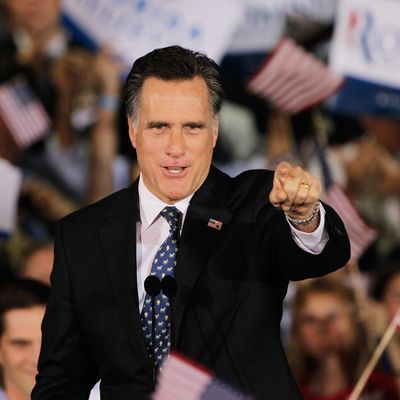
Let’s assume, for the sake of argument, that the Republican primary is truly, finally over now. (I assume it is: Either Rick Santorum or Newt Gingrich could challenge Mitt Romney if they had real money and the other was out of the race, but neither condition applies.) How has the process of securing the primaries affected the all-but-certain nominee, Mitt Romney? Romney obviously hoped to make it through the primaries completely undamaged, but things never go quite according to plan. Let’s tally up the pluses and the minuses.
The Good:
Strong by Comparison. Romney towered above the competition, which — aside from little-noticed Jon Huntsman — was a procession of goofballs, retreads, and cranks. This was a striking contrast to 2008, when Romney faced off against several accomplished national-level politicians. He came out of it looking more presidential by sheer contrast.
“Massachusetts moderate.” Romney spent virtually the whole of the campaign defining himself against more conservative opponents. He may have been positioning himself to their right, but some of the attacks did help define him as a centrist. If Newt Gingrich wants to keep assailing Romney as a “Massachusetts moderate,” Romney might consider slipping some cash into his PAC just to keep him going for a while.
Consistency. To position himself for 2008, Romney had to undergo a full political makeover, and was ridiculed by the media and fellow candidates as an almost comically opportunistic phony. Since he used up all his flip-flopping points four years ago, 2012 Romney has avoided conspicuously remaking himself further.
Unite the right. Ignore the angry recriminations from Gingrich’s remaining supporters. Conservatives will unite around Romney for the general election. Many conservative opinion leaders held back, perhaps hoping to force Romney to turn further right to gain their support, but they endorsed him in droves when the prospect of a Gingrich nomination stared them in the face. Now they’re fully invested in his general-election success.
The Bad:
Immigration. The brief, strong challenge from Rick Perry forced Romney to attack the Texas governor on one of his few deviations from conservative orthodoxy: his lack of hatred for illegal immigrants. Romney staked out staunch right-wing positions on immigration, and Latino voters have noticed.
Paul Ryan. Romney had coyly managed to avoid a full endorsement of the Republican budget, which ends the Medicare entitlement while slashing taxes for the rich. But the challenge from Gingrich, like the challenge from Perry before, forced Romney to lurch rightward in order to capitalize on his opponent’s weakness. (Gingrich had called the Ryan budget “right-wing social engineering.”) Romney wound up joining himself at Ryan’s hip.
Wealth and taxes. It was inevitable that Romney’s history at Bain Capital would hurt him. But the events of the campaign turned this into a far greater liability than anybody anticipated. Romney made a series of statements in which he came off as a sheltered rich man. He was forced to release one year’s worth of tax records, which revealed a scandalously low tax rate and money stashed in Swiss bank accounts and the Cayman Islands – things that signal shady without any further elaboration needed. The sum total was to turn Romney into the embodiment of a Republican stereotype and a useful foil for a populist Obama reelection campaign.
The Net Effect:
Well, it could have been worse. Romney could have lost, or been forced to promise a spot on the ticket to Michele Bachmann, or he could have emerged as an even more ridiculous version of the flip-flopping punch line from 2008.
On the other hand, Romney took on water that he won’t easily be able to bail out. He wanted to run as a pragmatic businessman looking out for the middle class, but he enters the general election painted, not unfairly, as a very rich man looking to preserve the policies that have benefited him, often unfairly. The best tool we have to measure a candidate is his favorability rating, and the end result for Romney has been awful.






























